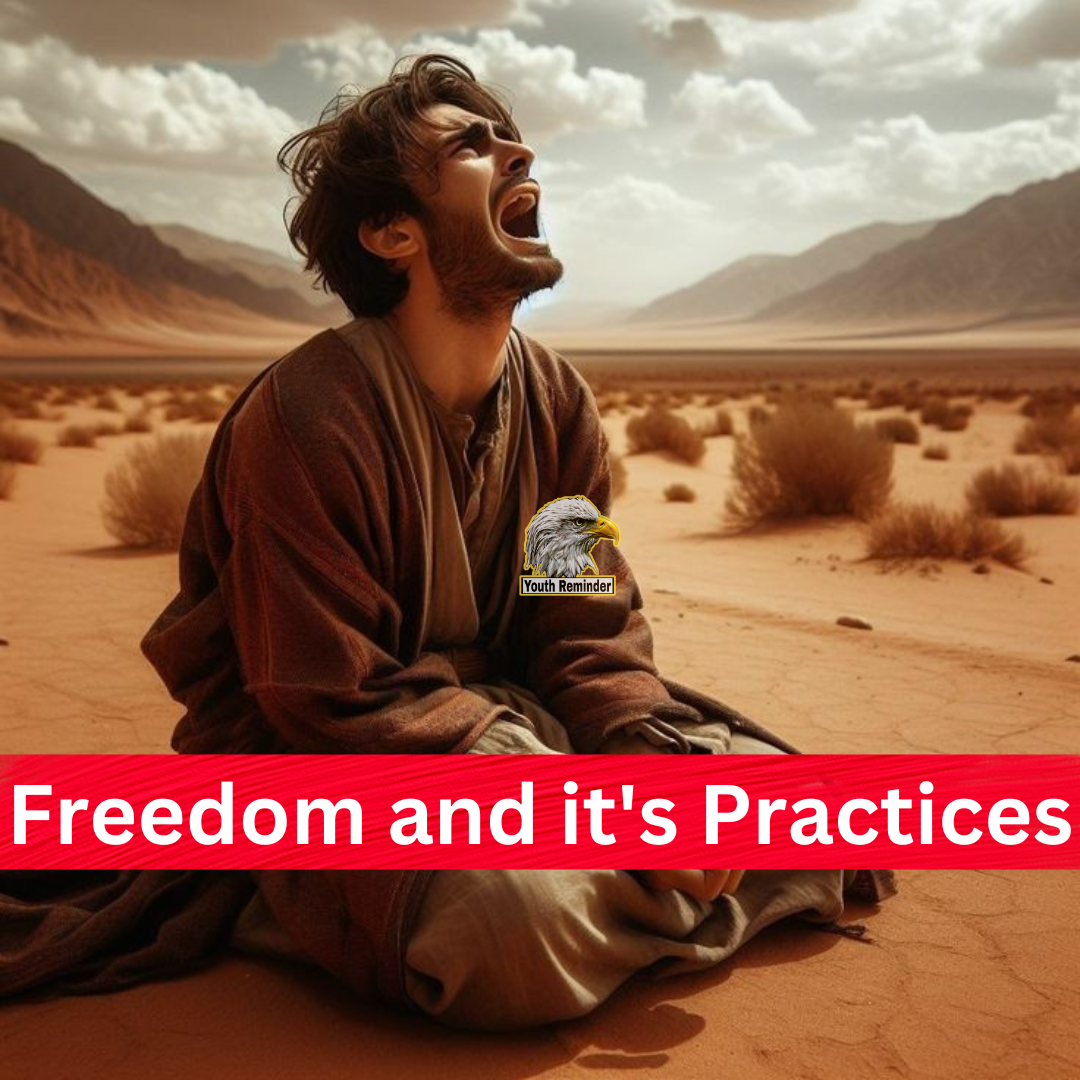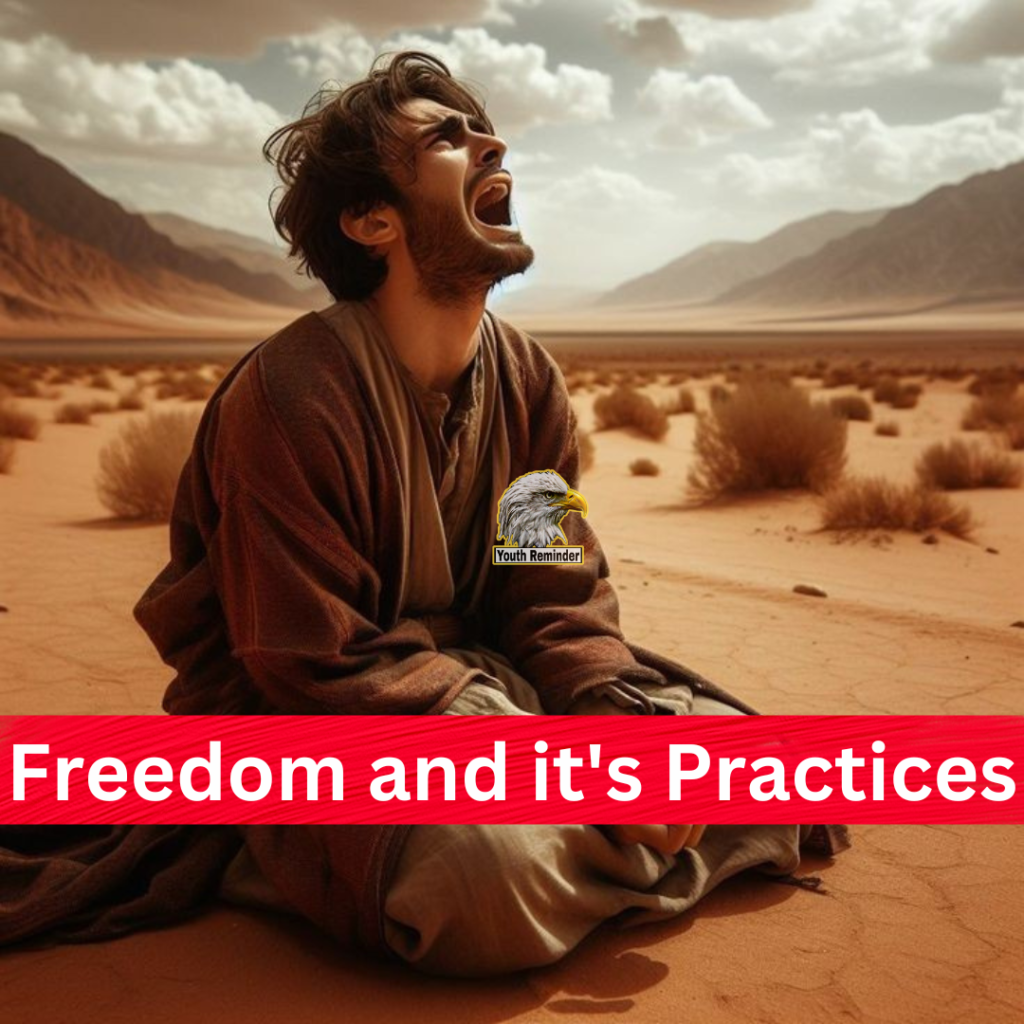Freedom and its Practices is self-determination, the ability to pursue one’s interests, b

eliefs and vision without unjustified interference or coercion.
At its best, freedom breeds creativity and innovation, allowing societies to nourish and individuals to flourish. It includes social freedom such as speech and expression, and the right to take part in decisions concerning society and the freedom from social fear, as well as personal freedoms to live in accordance with one’s values and beliefs.
A peaceful and free society must ensure the following freedom to its people.These are the basic rights of any human and it is the very first duty of any society to ensure these fundamental rights.
Types of freedom:
A peaceful and free society must ensure the following freedom to its people. These are the basic rights of any human and it is the very first duty of any society to ensure these fundamental rights.
Freedom of speech and expression
Freedom of speech is the right to express one’s opinions and ideas without fear of any retaliation or censorship. It guarantees people’s ability to openly talk about, criticize, and argue over different things. This freedom of speech and expression covers spoken, written and artistic expression in addition to shielding against silencing minority voices or dissenting opinions. Remember, it does not protect speeches that directly provoke violence or create an immediate risk.
Freedom of worship or religion
Freedom of religion ensures that no one can be to adopt an established religion nor interfered with while practicing his/her own faith.
- There are many aspects of Freedom and its Practices, involved in this concept such as being free to attend religious services, observe religious holidays and perform religious rituals among others.
- It applies equally to individuals of all religions who should therefore be allowed follow their consciences as well as express their spirituality freely without being discriminated against on account of what they believe in.
Freedom from want
Freedom from want secures freedom from what everyone needs, that includes food, shelter, health and education without poverty. It implies that each person should have necessary means to live a decent life without having to worry about fundamental insecurities. It is a very basic right of humanity;
- it therefore seeks to redress social-economic imbalances which can ensure the welfare of every member in the society.
- In following this, dream societies should create conditions under which people are not deprived materially as well as being barred from achieving their goals due to lack.
Freedom from fear
Freedom from fear denotes the belief that one can live freely without fearing any form of violence against oneself by others. It involves protection against physical hurt and psychological damage. This liberty creates an atmosphere where all individuals feel safe enough to air out their opinions even if they contradict those who hold positions power over them because they know no harm will befall them thus encouraging personal expression in public space.
How to secure freedom?
Authorities always make such rules and regulations to maintain the freedom of society. This freedom comes with some social responsibilities, some ethical and moral values to respect others opinions and freedom. To maintain the safety and peace of society, the freedom is needed to keep in some limits and requires some measures to retain it from exploitations.
Now, we take a brief look to how to secure this freedom and what freedom demands from people
Freedom and responsibility
Freedom and its Practices and responsibility are two equally significant components of any society, which wants to be just and fair. Freedom means the possibility of making decisions, realizing one’s own potential without any obstacles and restrictions; it seems great at first sight, but don’t forget that every medal has its reverse side. With freedom comes responsibility: each person must think about the consequences of their actions on themselves and others.
- Duty requires compliance with rules: it is necessary not only to follow laws and social norms but also to respect other people (because they have their own rights).
- If a person has freedom without responsibility, he ends up with chaos and harm because people only look out for themselves. On the flip side, if there’s too much emphasis on responsibility over freedom, it leads to oppression— squashing any sense of individual liberty.
- But finding a balance between the two is what paves way for a successful society. Where individuals can enjoy their rights but also understand that we are all connected in this human chain — where mutual respect and cooperation play vital roles.
- This fine balance nurtures an environment where freedom can thrive: while tethered to the realms of ethics and social responsibilities.
Respect of others freedom
The basic principle of creating a world that respects the Freedom and its Practices of others is to establish an atmosphere for mutual understanding, tolerance and cooperation. It involves appreciating every person’s value and rights irrespective of his beliefs, origins or way of life.
- Respecting the liberty of other people means not forcing our opinions or values on them but giving them enough room to express themselves without being condemned or even punished.
- Furthermore it demands from us active listening even when their views differ with ours as well as engaging into constructive conversation rather than using forceful methods against them.
- Additionally, this value requires one to desist from acts that violate somebody else’s opinions or limit their capacity to live by their own choices and convictions.
- Such actions may encompass but not limited to discrimination, oppression or any form of violence based on color, creed, and sex among other grounds.
- In a nutshell, respecting others’ freedom develops a climate where individuals are motivated towards living true lives, chasing after dreams and making positive impacts in society while at the same time acknowledging similar rights in other people.
Exploitation in the name of freedom
Freedom’s misuse happens when individuals or communities abuse the concept of freedom to explain actions that cause damage or subjugation towards others. This usually means taking advantage of power imbalances or societal privileges in order to gain benefits for oneself at the expense of other people, while pretending to be exercising one’s personal liberty.
- Exploitation takes under this guise is within interpersonal relationships; here one person manipulates another individual under the cover of his/her own personal freedom. Such cases are characterized by emotional blackmailing; forcing someone into doing things they do not want to do.
- Ultimately, what we should always remember is that when anyone uses their Freedom and its Practices against someone else’s then they have abused this particular value because true liberty cannot exist without respect.
Conclusion
Freedom is a passion for human desire and a beacon of hope that inspires people to strive for a better world. As we grapple with the challenges of modern life, we must promote and defend the principles of freedom in our own lives and in society as a whole. By embracing freedom with responsibility, reason and morality, we can create a future where freedom flourishes and people are fair and just.
